HMI'26 Invited Speakers
in alphabetic order of their last names
in alphabetic order of their last names

Professor of Pediatrics
Interim Assistant Dean of Admissions
Dell Medical School at the University of Texas at Austin
Dr. Abrams received his education from the Massachusetts Institute of Technology and The Ohio State University College of Medicine, followed by residency and fellowship training at Akron Children's Hospital, the National Institutes of Health, and Baylor College of Medicine. He is board certified in pediatrics and neonatal/perinatal medicine and is a practicing neonatologist.
Dr. Abrams held a professorship at Baylor College of Medicine and was involved in establishing and developing the field of neonatal nutrition at Texas Children's Hospital. Currently, he is a Professor of Pediatrics at the Dell Medical School at The University of Texas at Austin and Interim Assistant Dean of Admissions at the Medical School.
Dr. Abrams has been recognized with the Samuel J. Fomon Nutrition Award for his research and was inducted into the American Institute for Medical and Biological Engineering's College of Fellows for his contributions to improving nutrient supplements. He has held leadership positions with the American Academy of Pediatrics, served on two U.S. Dietary Guidelines Advisory Committees, and was named Editor-in-Chief of Advances in Nutrition.
Dr. Abrams is a leader in pediatric nutrition, focusing on nutrient requirements for bone and other minerals during childhood. His interests include the growth of preterm infants and nutritional practices for infants with intestinal issues. His research specifically investigates mineral requirements, particularly calcium, zinc, and iron metabolism in children, and he has developed methods using stable isotopes to study mineral requirements and turnover. Dr. Abrams has advised international governments on nutrition policy and strategies to address malnutrition. He also consults on incorporating key nutrients like calcium and iron into products. His work has significantly influenced the care of critically ill infants and young children globally.
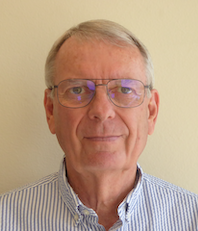
Affiliate Clinical Professor
Skaggs School of Pharmacy and Pharmaceutical Sciences
UC San Diego
Dr. Philip Anderson has lectured and published extensively on drug use during breastfeeding including in professional journals and textbooks. He wrote the chapter. “Medications and breastfeeding” in the first two editions of the “Breastfeeding handbook for physicians”, published by the American College of Obstetricians and Gynecologists & the American Academy of Pediatrics. Dr. Anderson is a member of the Editorial Board and the Pharmacology Editor of Breastfeeding Medicine, and writes a column on medication use during breastfeeding for the journal. He has also been a consultant to the US Food and Drug Administration on the topic of drug labeling with respect to use during lactation. Dr. Anderson founded LactMed®, which is a National Library of Medicine database. He continues to write LactMed® records and to expand the database.

Professor
President, European Milk Bank Association (EMBA)
Administrative Director of the Division of Neonatology & Department of Pediatrics İstanbul Medeniyet University, School of Medicine, İstanbul, Turkey
Scientific Coordinator and Member of the Board of Directors, Italian Association of Human Milk Banks (AIBLUD), Milan, Italy
Dr. Arslanoglu's main field of research is neonatal nutrition, human milk, human milk banking, human milk fortification, methodologies of preterm infant feeding, and prebiotics/microbiota. After 10 years of experience working in Northern Italy, mainly in Milan, in December 2011 she moved back to İzmir, Turkey by invitation, primarily to establish human milk banking in this country
During her stay in Italy she worked mainly as a neonatologist, and as “Responsible for the Nutritional Management in NICU and as the Coordinator of Nutritional Research” at the Center for Infant Nutrition of Macedonio Melloni Maternity Hospital, University of Milan. She also collaborated with Turin and Modena Universities as a Consultant on Neonatal Nutrition and Research. In 2008 Prof. Arslanoglu became an active ESPGHAN member. In 2009 she has been nominated as a component of the Working Group on Nutrition of the World Association of Perinatal Medicine. In 2010 she acted as one of the founding members of European Milk Bank Association (EMBA). She took the duty first as treasurer, then became the Vice President in 2012 and the President of EMBA in 2022.
At the end of 2011 on his return to Turkey, she was appointed as the Chief of the Division of Neonatology at the Children’s Hospital in İzmir. She established the first human milk bank there in 2013, but due to some religious issues, the established bank could not been functional officially. She designed a model of milk banking compatible with Islamic belief and her efforts are continuing for her journey of milk banking establishment in her country. Professor Arslanoglu had the academic degrees of Associate Professorship in 2009 and Full Professorship in 2015.
Dr. Arslanoglu is now acting as a clinician and academician at İstanbul Medeniyet University School of Medicine and is the Administrative Director of the Division of Neonatology & Department of Pediatrics at the University Hospital. She acted as organizer and/or scientific secretary in many international and national scientific congresses; participated to more than 80 international congresses as an invited speaker and moderator.
Dr. Arslanoglu is currently leading a Working Groups in the context of EMBA (Human Milk Fortification) and collaborating with Italian Association of Milk Banks as the Scientific Coordinator and Guidelines Working Group Member with the aim to improve the quality and nutritional value of donated milk through optimal fortification, processing and updated guidelines. Recently she is involved in the preparation of the breast milk chapter for the 6th edition of the European Directorate for the Quality of Medicines & HealthCare (EDQM) Guide to the quality and safety of tissues and cells for human application.
Her intensive research of 20 years on human milk and milk banking area resulted in numerous international/national guidelines, recommendations, ESPGHAN and other Society Consensus Statements, new fortification and milk banking models, and expansion of milk banking. She has more than 200 international and national publications and book chapters. Her publications have 7,794 citations and her h-index is 36.

President of Institut Pasteur
France
Prof. Belkaid is the President of the Institut Pasteur (Paris) and the head of the Metaorganism laboratory at the Institut Pasteur. She obtained her Master in Biochemistry at the University of Science and Technology Houari Boumediene in Algiers, Algeria and her PhD from the Institut Pasteur in France. Following a postdoctoral fellowship at the National Institutes of Health (Bethesda, USA) on immune regulation during infection, she started her research program at the Children’s Hospital Research Foundation in Cincinnati.
In 2005, she joined the National Institute of Allergy and Infectious Diseases (NIAID) where she served as department chair of the Laboratory of Host Immunity and Microbiome, Director of the trans-NIH Center for Human Immunology and founder and Director of the NIAID Microbiome program prior to joining the Institut Pasteur in 2024.
Her work explores fundamental mechanisms that regulate tissue homeostasis and host immune responses and uncovered key roles for the microbiota and dietary factors in the control of immunity and protection to pathogens. It also explores the role of the immune system in organismal remodeling and the impact of infections on the mother-child dyad. Prof. Belkaid is a member of the National Academy of Sciences, the American Academy of Arts and Sciences, the National Academy of Medicine, the French Academy of Sciences and Fellow of the Royal Society and she is the recipient of numerous awards including the Lurie Prize in Biomedical Sciences, the Emil von Behring Prize, the Sanofi-Institut Pasteur Award, the Robert Koch Award and the AAI Excellence in Mentoring Award.

Associate Professor
Animal Sciences
Purdue University
Dr. Theresa Casey earned her MS in Animal Sciences at the University of Vermont and PhD in cell and molecular biology also from the University of Vermont. Currently she is an Associate Professor in Animal Sciences at Purdue University where she studies mammary gland development, lactation physiology and the programming effects of milk on neonates.
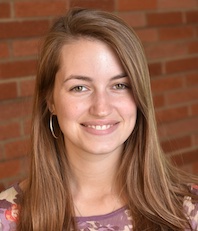
Postdoctoral Fellow
Boston Children’s Hospital
Dr. Elena Coley-O’Rourke completed her PhD in Neuroscience in 2024 in the lab of Dr. Elaine Hsiao at UC Los Angeles. Her work explored how the gut microbiome responds to environmental perturbations to influence neurodevelopment and behavior, with a specific focus on maternal microbiome and fetal neurodevelopment in the context of gestational malnutrition. She was funded by an NSF Graduate Research Fellowship and a UCLA Dissertation Year Fellowship. Dr. Coley-O’Rourke then moved to UC San Francisco to pursue postdoctoral training with Dr. Xianhua Piao studying neuroimmune and glial contributions to cortical interneuron development. She is currently a National Institute of Mental Health T32-funded postdoctoral fellow with Dr. Hisashi Umemori at Boston Children’s Hospital, studying the role of environmental factors on dopamine circuit development.

Instructor
Division of Rheumatology and Immunology, Department of Medicine
Vanderbilt University Medical Center
Dr. Rashmi Dhital is a rheumatologist at Vanderbilt University Medical Center with a clinical and research focus on maternal and child health in women with systemic autoimmune rheumatic diseases. She completed medical school in Nepal, an internal medicine residency at Reading Hospital in Pennsylvania, and a rheumatology fellowship at the University of California San Diego. She is board-certified in internal medicine and rheumatology.
Dr. Dhital’s work has focused on cardiovascular outcomes during pregnancy and early postpartum, placental abnormalities in lupus pregnancies, and human milk composition in women with rheumatic diseases. She has been supported by the Lupus Foundation of America (LFA) Career Development Award, the UC San Diego MPRINT Support Pool, and the Building Interdisciplinary Research Careers in Women’s Health (BIRCWH) program.

Claire Eden is a board-certified lactation consultant of over 15 years and has supported families with infants in intensive care settings for a decade. She is the EPIC Breastfeeding Program Director for the Georgia Chapter of the American Academy of Pediatrics. Her work includes developing and implementing statewide lactation education and policy projects in partnership with the state public health department and other partners.

Clinical Professor, Department of Family and Community Medicine
Medical Director, UW Breastfeeding and Lactation Medicine
University of WI School of Medicine and Public Health
President, The Institute for the Advancement of Breastfeeding and Lactation Education
Dr. Anne Eglash is a clinical professor with the University of Wisconsin School of Medicine and Public Health, in the Department of Family and Community Medicine. In addition to family medicine, she has been practicing breastfeeding and lactation medicine since 1994.
Dr. Eglash is a cofounder of the Academy of Breastfeeding Medicine, the Medical Director and cofounder of the Mothers’ Milk Bank of the Western Great Lakes, and the Medical Director of the University of Wisconsin Breastfeeding and Lactation Medicine Clinic. She has published many peer- reviewed articles on breastfeeding medicine and is a past associate editor for Breastfeeding Medicine Journal.
Dr. Eglash is founder and president of The Institute for the Advancement of Breastfeeding and Lactation Education (IABLE), as well as a cofounder, inaugural president, and immediate past-president of the North American Board of Breastfeeding and Lactation Medicine.

Primary Therapist
Huntington Hospital Maternal Wellness Program
Ms. Garritson is an integrative psychotherapist and birth educator with a private practice focused on maternal mental health. With over 12 years of experience, she supports women through the profound transitions of pregnancy, birth, and early parenting.
In addition to her private practice, Ms Garritson serves as the Primary Therapist for Huntington Hospital Maternal Wellness Program, an intensive outpatient program. She holds dual master’s degrees in Clinical Social Work (NYU) and Medical Anthropology (UCL), with advanced training in Perinatal Mental Health.
Her therapeutic approach blends psychoanalytic insight with solution-focused strategies, EMDR, and Hypnobirthing techniques. As a Doula and educator, she brings a uniquely holistic lens to her clinical work. She is also an Adjunct Clinical Instructor at USC’s Keck School of Medicine and sits on the training board of Maternal Mental Health Now.

Professor
Director of the UWA Centre for Human Lactation Research and Translation, ABREAST, and the West Australian Human Milk Biobank
University of Western Australia
Dr. Donna Geddes is a globally recognized for her human lactation and breastfeeding research. She is the Director of the UWA Centre for Human Lactation Research and Translation, ABREAST, and the West Australian Human Milk Biobank. Donna’s work is dedicated to addressing challenges in lactation, including the identification of factors contributing to low milk production and the development of diagnostic tools and effective treatments for lactating women. Prof Geddes team takes an innovative approach to the application of techniques to provide a holistic understanding of the dynamics of human lactation. She has used ultrasound to explore the physiology of lactation, providing groundbreaking insights into breast anatomy, milk ejection, and infant feeding behaviour. Her team is also committed to advancing our understanding of human milk composition, investigating its microbiome, immune proteins, macro- and micronutrients, and hormones to uncover their roles in maternal and infant health. As Sensor Lead for the ARC Biomedical Analysis Training Centre, she is involved in the integration of cutting-edge technologies into the development of point of care sensors for clinicians. She also advises for the International Milk Composition Consortium (iMiC) and the Mothers, Infants, and Lactation Quality (MILQ) project, where she contributes to advances in global lactation science

Assistant Professor
Division of Nutritional Sciences
Cornell University
Dr. Yarden Golan earned a Bachelor's degree in Nutrition Science and a Ph.D. in Biology from the Technion (Haifa, Israel). Her doctoral research focused on understanding the zinc transport mechanism into human milk via the zinc transporter ZnT2, as well as the effects of genetic variations on the structure and function of this transporter. During her postdoctoral research at the University of California, San Francisco (UCSF), Dr. Golan characterized the human milk transcriptome under both physiological conditions (colostrum, mature milk, and involution) and pathological conditions (low milk production and infection). Dr. Golan has received prestigious funding, including awards from the ISRHML–Family Larsson-Rosenquist Foundation Trainee Expansion Program and the Human Frontier Science Program (HFSP). Most recently, she was awarded the NIH K99/R00 Career Development Award. Dr. Golan recently joined Cornell University as an Assistant Professor in the Division of Nutritional Sciences. Her current research focuses on mechanisms and practices for increasing human milk production and investigating associations between milk composition and infant growth and health outcomes.
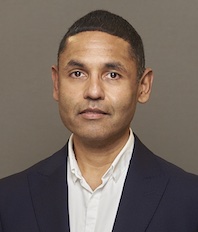
Director of the Larsson-Rosenquist Foundation Oxford Centre for the Endocrinology of Human Lactation (LRF OCEHL)
Nuffield Department of Women’s Reproductive Health
University of Oxford
Dr. Fadil Hannan is the Director of the Larsson-Rosenquist Foundation Oxford Centre for the Endocrinology of Human Lactation (LRF OCEHL) at the University of Oxford, UK. He is a physician and clinical chemist with a specific interest in hormone action. He studied Medicine at the University of Bristol, where he also obtained a first-class degree in Biochemistry. His research career began in the mid-2000s when he started investigating genetic disorders of calcium metabolism as an MRC Clinical Research Training Fellow at the University of Oxford. His current research interests include: the cellular basis of lactation hormone action, particularly during secretory activation; and the impact of extreme heat exposure on lactation and breastfeeding. He is a co-investigator on the Wellcome-funded Heat-in-Pregnancy in India (HiP-India) study. He was elected as a fellow of the Association of Physicians of Great Britain and Ireland in 2021, and is also the recipient of the 2023 Clinical Endocrinology Journal Foundation Lecture Award.

Distinguished Professor of Molecular, Cell, and Developmental Biology
Director, Institute for the Biology of Stem Cells
University of California, Santa Cruz
Dr. Lindsay Hinck is a developmental and epithelial biologist with a strong interdisciplinary background. She is the Distinguished Professor of Molecular, Cell, and Developmental Biology at the University of California, Santa Cruz, and directs the University’s Institute for the Biology of Stem Cells. She earned her M.S. in Biochemistry from the University of California, Davis, and her Ph.D. in Cancer Biology from Stanford University, followed by postdoctoral training in Neuroscience at the University of California, San Francisco. Dr. Hinck joined the UCSC faculty in 1998. Currently, Dr. Hinck’s lab examines how the DNA damage response is regulated in the contexts of lactation and endometriosis. From 2016 to 2022, she led a collaborative drug-discovery program with Zoetis, a leading animal health company, developing stem cell-based approaches to enhance milk production in ruminant animals.
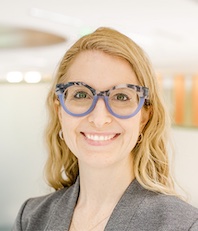
Staff Neonatologist
Director of Breastfeeding Medicine
Director of Clinical Guideline Development
Seattle Children’s Hospital Division of Neonatology
Associate Professor of Pediatrics, University of Washington
Dr. Rebecca Hoban is a board certified neonatologist with a strong clinical, research, and educational interest in human milk and lactation. Dr. Hoban graduated from Indiana University School of Medicine and completed pediatric residency at Cincinnati Children’s, neonatology fellowship at Tufts Floating Hospital Boston, and a masters in public health at Harvard. She has held positions as a staff neonatologist at Rush University Medical Center in Chicago and the Hospital for Sick Children/University of Toronto in Canada, before moving back to the US in 2023 to become Director of Breastfeeding Medicine for the Division of Neonatology at Seattle Children’s Hospital and the University of Washington. She brings extensive clinical, educational, and training experiences from a dozen countries and is active in clinical and translational human milk research. Recent research and clinical projects include improving human milk provision in the high-risk neonatal population, milk sodium and biomarkers to predict lactation success, lactation in the context of substance use, and human milk as potential stem cell therapy in preterm infants with intraventricular hemorrhage.

PhD Candidate
University of Western Australia, Perth
Xuehua Jin is a current PhD candidate at the University of Western Australia, whose research explores the biological and maternal factors that shape human milk composition and milk supply. Her work focuses on how conditions such as maternal adiposity and gestational diabetes influence milk production, with the goal of improving understanding and clinical support for low milk supply. Xuehua is passionate about combining lactation science with advanced data analysis to uncover new insights that support breastfeeding families.

Professor and Chair
Department of Biomedical Informatics, College of Medicine
Ohio State University
Dr. Lang Li is a Professor and Chair in the Department of Biomedical Informatics (DBMI) in the College of Medicine at the Ohio State University. Dr. Li’s lab has specialized in the translational research in drug interaction and personalized medicine. Using AI/ML technologies, system pharmacology models and informatics approaches, Dr. Li’s lab translates molecular mechanisms of drug interactions and pharmacogenetics into pharmaco-epidemiology studies, and vice versa. Dr. Li successfully identified loratadine/simvastatin interaction induced myopathy in mining both PubMed literature and electronic medical records. Further in vitro studies demonstrated that loratadine/simvastatin interaction induced myopathy is likely due to the direct muscle myocyte toxicity. Recently, using large language models and literature-based text mining, Dr. Li and his lab develop a number of knowledge bases for clinical and translational research in cancer (DrugCombo) and pediatric/maternal (MPRINT-KP) patient populations. Dr. Li’s research has been extensively and consistently funded by NICHD, NLM, NCI, NIA and NCATS.

Managing Director
Family Larsson-Rosenquist Foundation
Switzerland
Dr. Lichtner joined the Foundation in 2015. She brought decades of deep, complimentary expertise in science, business building, investing and leadership. Under her strategic and operational leadership, the Foundation has developed from a newly established philanthropy with a big vision to an internationally recognized funder and innovator in the field of breastfeeding and breastmilk. In less than 10 years, the Foundation endowed five independent research centers focused on human milk research – including LRF MOMI CORE at the University of California San Diego.
During its first decade, the Foundation funded over 20 discrete research and tool development projects, and launched LactaHub – an online platform offering free, evidence-based breastfeeding and breastmilk knowledge to health practitioners, researchers and decisionmakers. Since 2021, Dr. Lichtner has also been in active, hands-on collaboration with government leaders and public health experts in Ghana, developing an innovative way to operationalize a government’s breastfeeding policy.
Dr. Lichtner trained in biochemistry and molecular biology and holds a PhD in immunology from the Basel Institute for Immunology. She launched her career with McKinsey & Company, then co-founded Capital Dynamics in 1999, co-leading the private asset manager operationally and strategically for nearly 15 years. Next, she took Digital Overlay®, a ground-breaking virtual replacement technology for in-stadium perimeter advertising boards, from a technology invention to market entry in three years, as CEO and partner with startup AIM Sport Vision.

Founder, Liminal
Liz Neeley began her career in ocean conservation, where she learned the hard way that the data don’t speak for themselves. After a crushing policy loss on the international stage, she was determined to understand how power actually works. She focused first on agenda-setting via press coverage and then within social media, before turning her attention to the undeniable impact of personal stories.
She put those experiences to work training thousands of scientists in science communication and storytelling. She has enjoyed meaningful collaborations in fields as disparate as fisheries ecology, cognitive neuroscience, and computer science.
More than anything, she focuses on helping scientists find the courage and language they need to create change within themselves, their institutions, and the world.
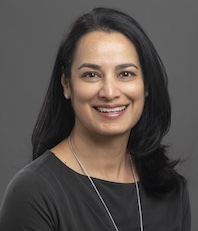
Professor of Pediatrics
Rush University Children's Hospital
Dr. Aloka Patel is the Glore Family Professor of Neonatology at Rush University, where she is the Division Head and the Research Director for Neonatology. Dr. Patel’s research has focused on health and cost outcomes associated with human milk feedings for very preterm infants, understanding barriers to continued provision of maternal milk and multiple nutritional clinical trials in preterm infants. Dr. Patel has been funded by NIH to test interventions to increase milk provision for very preterm infants, and an ongoing observational study following these infants into childhood.

Joanie Randle is a Clinical Research Nurse in the Center for Perinatal Research, Division of Neonatology at Nationwide Children’s Hospital in Columbus, Ohio. She has supported breastfeeding families since 1990 and brings 10 years of experience as a NICU nurse to her current role. Her work focuses on how mother’s own milk (MOM) impacts NICU outcomes, prevention of necrotizing enterocolitis, and developing new models of lactation care for NICU families.
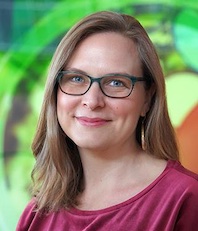
Chief of the Division of Breastfeeding & Lactation Medicine
Associate Professor of Pediatrics and OBGYN
Fellowship Director, Breastfeeding & Lactation Medicine, LILAC
Consultant, Lactation Study Center, URMedicine MotherToBaby, Finger Lakes Environmental Health Center
University of Rochester School of Medicine and Dentistry
Casey Rosen-Carole, MD, MPH, MSEd, NABBLM-C, FABM, is the Founding Chief of the Division of Breastfeeding and Lactation Medicine at the University of Rochester in New York, USA—the first such division in the world. She completed her training in Pediatrics at Yale University, followed by fellowship training in General Academic Pediatrics and Breastfeeding Medicine under Dr. Ruth Lawrence at the University of Rochester. Having served on the inaugural board of the North American Board of Breastfeeding and Lactation Medicine, she is currently completing the second of two terms on the board of the Academy of Breastfeeding Medicine.
Dr. Rosen-Carole established and currently directs the LILAC Fellowship, the only NABBLM-certified fellowship in Breastfeeding and Lactation Medicine, as well as the University of Rochester’s in-person departmental fellowship. As a consultant to the Human Lactation Study Center and the Finger Lakes Environmental Health Center, she provides expert guidance on complex breastfeeding cases and concerns from across the globe.
An accomplished author and editor, Dr. Rosen-Carole served as a writer and associate editor for the 9th Edition of Lawrence’s Breastfeeding: A Guide for the Medical Profession and is co-editor of the forthcoming 10th Edition. She is widely published across a broad range of topics critical to breastfeeding and lactation management. Her current scholarly focus includes the development and implementation of best practices for the care of lactating families, as well as the advancement and dissemination of postgraduate education in breastfeeding and lactation medicine.

Assistant Professor of Pediatrics
Hematology Oncology
University of California San Diego / Rady Children’s Hospital
Dr. Sunita Sridhar received her education from the University of California Berkeley and Albert Einstein College of Medicine, followed by residency at UC San Francisco Benioff Children’s Hospital Oakland and fellowship training in hematology oncology at UC San Diego. She is board certified in pediatrics and pediatric hematology oncology and is a practicing pediatric oncologist at Rady Children’s Hospital, specializing in solid tumor and neuro oncology.
Dr. Sridhar is a pediatrician, first time mother, and former NICU graduate. She was unexpectedly born early with an emergency C section at 32 weeks. Her course was further complicated by necrotizing enterocolitis upon exposure to milk. She never expected to be in the same situation 34 years later as a new mother when her baby was born premature at 30 weeks. Both she and her baby benefited from donor human milk during their time in the NICU.